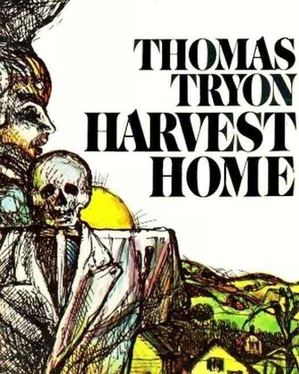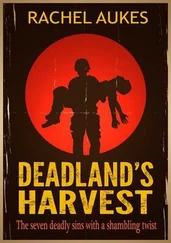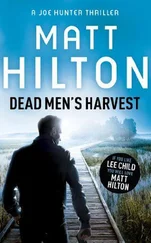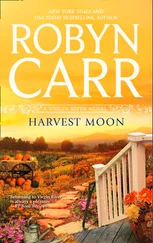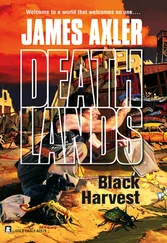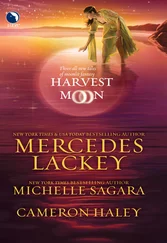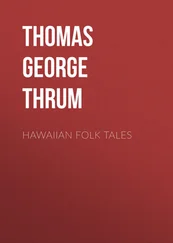Thomas Tryon - Harvest Home
Здесь есть возможность читать онлайн «Thomas Tryon - Harvest Home» весь текст электронной книги совершенно бесплатно (целиком полную версию без сокращений). В некоторых случаях можно слушать аудио, скачать через торрент в формате fb2 и присутствует краткое содержание. Жанр: Ужасы и Мистика, на английском языке. Описание произведения, (предисловие) а так же отзывы посетителей доступны на портале библиотеки ЛибКат.
- Название:Harvest Home
- Автор:
- Жанр:
- Год:неизвестен
- ISBN:нет данных
- Рейтинг книги:5 / 5. Голосов: 1
-
Избранное:Добавить в избранное
- Отзывы:
-
Ваша оценка:
- 100
- 1
- 2
- 3
- 4
- 5
Harvest Home: краткое содержание, описание и аннотация
Предлагаем к чтению аннотацию, описание, краткое содержание или предисловие (зависит от того, что написал сам автор книги «Harvest Home»). Если вы не нашли необходимую информацию о книге — напишите в комментариях, мы постараемся отыскать её.
For Ned and his family, Cornwall Coombe was to be come a place of ultimate horror.
Harvest Home — читать онлайн бесплатно полную книгу (весь текст) целиком
Ниже представлен текст книги, разбитый по страницам. Система сохранения места последней прочитанной страницы, позволяет с удобством читать онлайн бесплатно книгу «Harvest Home», без необходимости каждый раз заново искать на чём Вы остановились. Поставьте закладку, и сможете в любой момент перейти на страницу, на которой закончили чтение.
Интервал:
Закладка:
It turned on me the most terrible countenance I had ever seen. An appalling face, the flesh was as white as the clothes, except for the dark recesses of the eyes and the red, grinning mouth. It was this grin that made it seem more horrible, scarcely a smile at all, but the parody of one. A poor, painted smile, witless, demented, grim, the inane smile of a rag doll. Dark gouts of liquid erupted from the corners of the mouth while one hand-feeble, supplicating-lifted in a pitiful gesture and tore at the grin, as though to strip it away.
Then the haggard thing performed a grotesque reel, a dance of agony, twirling slowly, slowly, head once more thrown back to the night sky.
In another moment it had disappeared, vanished as though, in the tradition of ghosts, it had dematerialized. I ran and shut off the car motor, then laboriously made my way up the embankment, using rocks and projecting roots to clamber up the steep incline and onto the grassy plateau at the top.
There was nothing, only the swath of wind-whipped grass, the edge of the woods beyond, and, beyond that, darkness. I called out. No answer came, and no sign at all of the white apparition.
The clouds scraped across the face of the moon. Suddenly bright and shiny as it moved slowly toward the west, it again poured a dazzling white over the dark landscape. I thought how big and bright and shining it was, and how far away, noting its visible geography, its clearly delineated craters, mountains, deserts, seas. Again I lowered my gaze, taking one last look for that other, impossible shape I had seen. And standing there, listening to the wind, I felt sure this was no ghost, no supernatural creature, but something as real as the moon itself, real enough to have been human and alive.’
12
Real enough; but had it been alive? Or was I falling under the influence of Cornish witch tales and charms? I thought of telling Beth of the strange apparition, then, remembering the old trouble, and how easily influenced she was, I decided against it. Better to let the village weave its more salutary spells, whose good effects were so clearly already at work upon her. I was persuaded that it was better to leave my tale of the Ghost of Soakes’s Lonesome for another, more appropriate time.
The next day, Monday, I worked in the studio sanding the gesso panel I would use for my painting of the covered bridge. When Worthy came, I interrupted my work to help him tackle the roofing job. He was moody again today, with little to say regarding the excursion to Nonesuch Farm, other than that Kate had enjoyed it. I made no allusion to the strange event of last night, and between us we limited ourselves to the scantest of small talk until Beth called us to come in. We ate lunch from folding tables in the bacchante room so we could watch the replays of the Olympic events. Mark Spitz had captured another gold medal, and they were saying he would take an even seven and make Olympic history; I wished him the joy of all that gold.
When we had eaten, I left Worthy to complete the roofing job alone and, taking my water-color equipment, I set out for the Lost Whistle Bridge. On a sudden thought, I pulled in at the Pettinger farm to have a word with Worthy’s mother and father. The place wasn’t much by anybody’s standards, not “all-electric” like the Hookes’s, and without indoor plumbing. Like the rest of Cornwall Coombe, the Pettingers had planted corn wherever the ground might bear it. There was a well and a springhouse, a chicken run, and a barn. If Fred Minerva was jokingly referred to as the biggest hard-luck farmer in the community, Wayne Pettinger surely was the poorest. He had two other sons to help him with the work, but it quickly became evident that he begrudged the time “the boy” was giving to others, myself included.
Both of them, the mother and the father, had the tired, careworn look of the workaday farmer fighting a losing battle against the soil, and neither seemed inclined to discuss Worthy’s trouble when I bearded them in the kitchen, but only sat bleakly and with unswerving gaze as they heard me out. I told them I felt that Worthy should be given a chance, that a great disservice would be done in stopping his schooling,
Mr. Pettinger was angry and adamant. The boy was full of fool notions. Theirs was a poor farm, but with seven years of Worthy’s being Harvest Lord it could become a rich one. Men would come and work it for him and not charge for labor; it could be the place they’d always dreamed it might be. Honor had been conferred; but no, the boy didn’t want honors, he wanted to be off with them hippies over to Danforth. Mr. Pettinger damned left and right: damned machinery, damned modern methods, damned folks who wasn’t satisfied with what they had but was so greedy they had to have more. Kids today didn’t know how well-off they was.
He turned to Mrs. Pettinger. “It’s your fault, givin’ him learnin’. There’s where the trouble starts-never should’ve let him go to school.” He clumped out to the barn, leaving me facing his wife, whose eyes were now streaming.
Clutching her red hands on the oilcloth-topped table, she confided to me that she had heard Worthy planning to run off. I replied that I thought young people should be allowed to do with their lives as they saw fit. She listened with a woebegone expression, dabbing at her eyes with her apron.
“He don’t laugh no more,” she said. “He was the most agreeable of all of ‘em, you never seen a boy so pleasing, and so easy to please.” Her smile was frail as she stared at her hands. “And he’s bright, too. Not like-them.” She jerked her head toward the dooryard where Worthy’s brothers were shoveling manure. “Seems like he’s always had his nose into everything.”
But then she’d heard him, out behind the mulch heap, telling Junior Tatum how he planned to run off to Danforth if he couldn’t go to college. Her heart had been sorely tried. Planning to leave the village, leave Cornwall Coombe. Had she failed? Hadn’t he been raised right?
Finding the mother’s grief hard to witness, I tried to speak some words of comfort, but she continued as though I weren’t there.
“I tell myself, hope and custom will be my stren’th. But he’s a mind of his own; he’s different. And in Cornwall Coombe it don’t pay to be different. You got to go by what folks say, and what they think.” She rose. “And what they do,” she added. I sensed that these words were for my benefit as well, as though through some instinctive kindness she did not want me to make a similar mistake.
She followed me to the door, then seized my hand impulsively and said with a passionate look, “Help him, mister, can’t you?”
I spent the afternoon by the bridge, before my easel, my thoughts on the boy. Last night’s hot wind still continued, and it made outdoor painting difficult, but I persevered until I had accomplished two passable water-color studies. Shortly after four o’clock, I packed up my gear, stowed it in the car, and drove back up the Old Sallow Road.
I turned the bend where I had seen the “ghost” the night before, and pulled onto the shoulder. I climbed the embankment and made a careful investigation of the terrain, noting that the grass had been trampled, which bolstered my theory that what I had seen was no supernatural being, but human.
With a backward glance at the Tatum house across the way, I crossed the patch of trodden ground and approached the edge of Soakes’s Lonesome. From within its shadowy recesses came the plaintive barking of a fox. Birds overhead chirped and sang as they flitted from branch to branch. Beyond the trees I could just make out the flat blue plane of water that was the river, and heard the dull chug of the Soakeses’ skiff from the farther shore. The heat of the day was gradually cooling, condensing into mists along the bank, only to be unraveled by the wind.
Читать дальшеИнтервал:
Закладка:
Похожие книги на «Harvest Home»
Представляем Вашему вниманию похожие книги на «Harvest Home» списком для выбора. Мы отобрали схожую по названию и смыслу литературу в надежде предоставить читателям больше вариантов отыскать новые, интересные, ещё непрочитанные произведения.
Обсуждение, отзывы о книге «Harvest Home» и просто собственные мнения читателей. Оставьте ваши комментарии, напишите, что Вы думаете о произведении, его смысле или главных героях. Укажите что конкретно понравилось, а что нет, и почему Вы так считаете.
